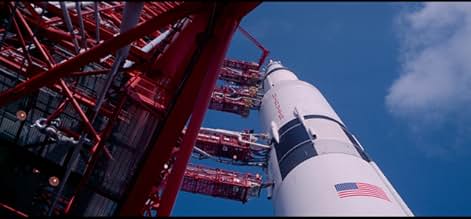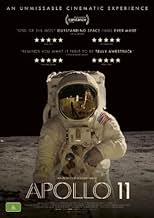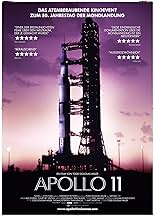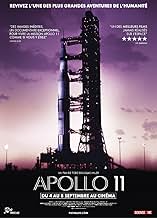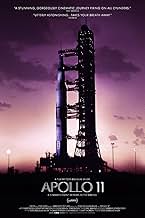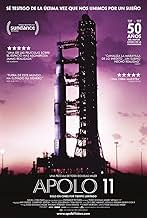VALUTAZIONE IMDb
8,1/10
28.111
LA TUA VALUTAZIONE
La missione Apollo 11 e l'atterraggio sulla Luna condotta dal comandante Neil Armstrong e il pilota Buzz Aldrin.La missione Apollo 11 e l'atterraggio sulla Luna condotta dal comandante Neil Armstrong e il pilota Buzz Aldrin.La missione Apollo 11 e l'atterraggio sulla Luna condotta dal comandante Neil Armstrong e il pilota Buzz Aldrin.
- Vincitore di 3 Primetime Emmy
- 59 vittorie e 44 candidature totali
Neil Armstrong
- Self - Mission Commander
- (filmato d'archivio)
Mike Collins
- Self - Command Module Pilot
- (filmato d'archivio)
Buzz Aldrin
- Self - Lunar Module Pilot
- (filmato d'archivio)
- (as Edwin 'Buzz' Aldrin)
Deke Slayton
- Self - Director of Flight Crew Operations
- (filmato d'archivio)
Clifford E. Charlesworth
- Self - Flight Director Green Team
- (filmato d'archivio)
Bruce McCandless II
- Self - Capsule Commuicator (CAPCOM) Green Team
- (filmato d'archivio)
- (as Bruce McCandless)
Charles Duke
- Self - Capsule Communicator (CAPCOM) White Team
- (filmato d'archivio)
Gene Kranz
- Self - Flight Director White Team
- (filmato d'archivio)
Jim Lovell
- Self - Backup Commander
- (filmato d'archivio)
John F. Kennedy
- Self - President of the United States of America
- (filmato d'archivio)
Janet Armstrong
- Self
- (filmato d'archivio)
Patricia Mary Finnegan
- Self
- (filmato d'archivio)
Andy Aldrin
- Self
- (filmato d'archivio)
Joan Ann Archer
- Self
- (filmato d'archivio)
- (non citato nei titoli originali)
Walter Cronkite
- Self
- (filmato d'archivio)
- (non citato nei titoli originali)
Lyndon B. Johnson
- Self
- (filmato d'archivio)
- (non citato nei titoli originali)
Recensioni in evidenza
"Apollo 11" (2019 release; 93 min.) is a documentary about the Apollo 11 mission. As the movie opens, we are informed it is "July 16, 1969" and a mere 3 hours away from the launch. We get full-color footage of the enormous crowds 15 mi. away from the launching pad. Meanwhile, through a quick photo montage, we get a quick glimpse at the three astronauts' life, as they are getting their space suits on. The TV commentator meanwhile talks about "the burdens and hope they carry for all mankind". It is then time for the astronauts to be driven to the Apollo. At this point we are then 10 min. into the movie.
Couple of comments: this documentary is directed and edited by Todd Douglas Miller. There have been many documentaries about the Apollo 11 mission before, so what sets this one apart? Several things: first and foremost, during the collaboration between the film makers and NASA, never before seen 70 mm full color footage was unearthed. That, combined with previously available 16 mm and 32 mm footage allowed the film makers to present this story in a way never before experienced. Frankly, words are not enough. The astronauts' elevator ride up to the top of the Apollo space ship (over 300 ft. tall) finally give a sense of how freaking high that is. Second, the film makers decided to use no voice-over or narrator, and instead let the TV commentary and the internal NASA discussions do all of the talking. Third, there is a fabulous electronic score, courtesy of composer Matt Morton. And get this: Morton used only instruments that were around at the time of Apollo 11's trip to the moon in July, 1969, including including the Moog modular Synthesizer IIIc, the Binson Echorec 2, and the Mellotron. Wow, just wow. When you combine all of these elements, it makes for outright compelling viewing. Even though we of course know the outcome, I nevertheless STILL felt tense as I was watching all of this unfold.
You may or may not be aware that Neil Armstrong spent the last 40 years of his life here in Cincinnati (where I live), including teaching at the University of Cincinnati. Upon his retirement, he became an even more private person than he already was, and public appearances were rare. I had the great fortune of seeing him narrate the "Lincoln Portrait" at a Cincinnati Pops performance in 2009, and the outpouring of love, respect and affection from the public for this true American hero made the hairs stand on my arms. Meanwhile, "Apollo 11" is an unforgettable movie experience, and highly recommended!
*UPDATE Jan 13, 2020* This past weekend I saw an edited version of the film called "Apollo 11 - First Steps Edition" at the Omnimax theater of the Cincinnati Museum Center. It is the exact same footage as in the original film, cut down to 45 min. so as to fit the IMAX/Omnimax schedules. I was incredibly excited beforehand, as I thought this would be true Imax/Omnimax footage, but alas, that is not the case. It's as before but projected on the half-dome screen that is the Omnimax. Still very enjoyable, and I love, LOVE the original score by Matt Morton blasting away in an Omnimax setting.
Couple of comments: this documentary is directed and edited by Todd Douglas Miller. There have been many documentaries about the Apollo 11 mission before, so what sets this one apart? Several things: first and foremost, during the collaboration between the film makers and NASA, never before seen 70 mm full color footage was unearthed. That, combined with previously available 16 mm and 32 mm footage allowed the film makers to present this story in a way never before experienced. Frankly, words are not enough. The astronauts' elevator ride up to the top of the Apollo space ship (over 300 ft. tall) finally give a sense of how freaking high that is. Second, the film makers decided to use no voice-over or narrator, and instead let the TV commentary and the internal NASA discussions do all of the talking. Third, there is a fabulous electronic score, courtesy of composer Matt Morton. And get this: Morton used only instruments that were around at the time of Apollo 11's trip to the moon in July, 1969, including including the Moog modular Synthesizer IIIc, the Binson Echorec 2, and the Mellotron. Wow, just wow. When you combine all of these elements, it makes for outright compelling viewing. Even though we of course know the outcome, I nevertheless STILL felt tense as I was watching all of this unfold.
You may or may not be aware that Neil Armstrong spent the last 40 years of his life here in Cincinnati (where I live), including teaching at the University of Cincinnati. Upon his retirement, he became an even more private person than he already was, and public appearances were rare. I had the great fortune of seeing him narrate the "Lincoln Portrait" at a Cincinnati Pops performance in 2009, and the outpouring of love, respect and affection from the public for this true American hero made the hairs stand on my arms. Meanwhile, "Apollo 11" is an unforgettable movie experience, and highly recommended!
*UPDATE Jan 13, 2020* This past weekend I saw an edited version of the film called "Apollo 11 - First Steps Edition" at the Omnimax theater of the Cincinnati Museum Center. It is the exact same footage as in the original film, cut down to 45 min. so as to fit the IMAX/Omnimax schedules. I was incredibly excited beforehand, as I thought this would be true Imax/Omnimax footage, but alas, that is not the case. It's as before but projected on the half-dome screen that is the Omnimax. Still very enjoyable, and I love, LOVE the original score by Matt Morton blasting away in an Omnimax setting.
Should be mandatory watching for all the folks that have lost the feeling of global humanity. I remember it from 50 years ago and I feel proud of the world as it looked then and the can do attitudes. The grace and humility of Neil Armstrong and crew was amazing. I was excited at each event and the music was marvelous. You know they make it but the tension was intense. so much could have gone wrong. What was error 202 !!!
The restored 70mm footage looks like it was shot yesterday. It will make your jaw drop on the massive screen. There's something simply astounding about old restored 35mm, 65mm and 70mm footage viewed in full resolution today - it's like stepping into a time-machine and being transported, like you are really there. Any 70mm footage projected on an IMAX screen is simply magical, but this is not just real footage, but footage capturing possibly the most important moment in human history - certainly the most inspiring. You won't be able to experience the same thing at home, so I wish everyone would go out to their local IMAX and experience this first-hand. This is the kind of thing schools should require their students to experience.
The only reason I don't give it a perfect 10/10 is that because the film is made in a cinéma-vérité style, the audience simply experiences the event without really learning very much about the incredible engineering, science, training and logistics of the incredible Apollo program. So I hope this film inspires people to also seek out The Right Stuff (1983), Apollo 13 (1995), the massively underrated miniseries From the Earth to the Moon (1998) and the invaluable documentary In the Shadow of the Moon (2007) - possibly the definitive documentary about the Apollo program - which you should watch as a companion piece to this film.
The only reason I don't give it a perfect 10/10 is that because the film is made in a cinéma-vérité style, the audience simply experiences the event without really learning very much about the incredible engineering, science, training and logistics of the incredible Apollo program. So I hope this film inspires people to also seek out The Right Stuff (1983), Apollo 13 (1995), the massively underrated miniseries From the Earth to the Moon (1998) and the invaluable documentary In the Shadow of the Moon (2007) - possibly the definitive documentary about the Apollo program - which you should watch as a companion piece to this film.
"I didn't feel like a giant. I felt very, very small." Neil Armstrong looking on earth from the moon.
If somehow you missed Apollo 11's flight to the moon in 1969 (indeed you might not have been born yet), fear not: The perfect documentary about those three real superheroes is here. The titular doc stars Neil Armstrong, Buzz Aldrin, and Michael Collins in nail biting suspense and no explosions save rocket propulsion.
The only part not of the original footage is the original synth drones' soundtrack by an inspired Matt Morton. The percussive beat has pomp like that of a thriller in which the president has a fleet of black SUV's rolling to its heart-beating energy, supporting a blockbuster that this time is for real.
Notwithstanding the deeply introspective First Man, starring Ryan Gosling as Armstrong, the real Armstrong comes through in this doc. As expected, he's like the straight arrow he is alleged to be-good guy, slightly nerdy, smart, evident even with as little face time as he has here.
Maybe that's the point: Without the sophisticated computers we have 50 years later, these astronauts and technicians work hard long hours together, no claims to glory, profit, or party loyalty. Their collaboration is worthy of any Marvel voyage; only it's real.
New images and sounds emerge despite the decades of depicting this event in multi-media. Some NASA shots have never been seen before. Although the images may not be as spectacular as the ones we've grown accustomed to, they represent the constantly renewable glory of mankind at its technological best, devoid of petty ego embellishments and full of human connections.
You'll find more dramatic renditions of this adventure, but you'll never find 93 minutes more perfectly capturing the grandeur of science and humanity working together to realize the impossible. This right stuff is right here in a grand documentary called, very simply, Apollo 11.
If somehow you missed Apollo 11's flight to the moon in 1969 (indeed you might not have been born yet), fear not: The perfect documentary about those three real superheroes is here. The titular doc stars Neil Armstrong, Buzz Aldrin, and Michael Collins in nail biting suspense and no explosions save rocket propulsion.
The only part not of the original footage is the original synth drones' soundtrack by an inspired Matt Morton. The percussive beat has pomp like that of a thriller in which the president has a fleet of black SUV's rolling to its heart-beating energy, supporting a blockbuster that this time is for real.
Notwithstanding the deeply introspective First Man, starring Ryan Gosling as Armstrong, the real Armstrong comes through in this doc. As expected, he's like the straight arrow he is alleged to be-good guy, slightly nerdy, smart, evident even with as little face time as he has here.
Maybe that's the point: Without the sophisticated computers we have 50 years later, these astronauts and technicians work hard long hours together, no claims to glory, profit, or party loyalty. Their collaboration is worthy of any Marvel voyage; only it's real.
New images and sounds emerge despite the decades of depicting this event in multi-media. Some NASA shots have never been seen before. Although the images may not be as spectacular as the ones we've grown accustomed to, they represent the constantly renewable glory of mankind at its technological best, devoid of petty ego embellishments and full of human connections.
You'll find more dramatic renditions of this adventure, but you'll never find 93 minutes more perfectly capturing the grandeur of science and humanity working together to realize the impossible. This right stuff is right here in a grand documentary called, very simply, Apollo 11.
A half-century ago, Neil Armstrong stepped off the ladder of the Lunar Module Eagle and into the history books. In the decades since, that moment and the flights of NASA's Apollo program have been chronicled in seemingly countless documentaries. At the top of that list remains 1989's For All Mankind from the late Al Reinert and 2007's In The Shadow Of The Moon from British filmmakers David Sington and Christopher Riley. Up there with them now is 2019's Apollo 11, an exciting new film from Todd Douglas Miller that is begging for you to see it on the biggest screen possible.
Why?
In part because of Miller who, like those other great filmmakers of Apollo before him, wasn't content to merely do a rehash of what had come before. Miller's Apollo 11 is in part a deep dive into the NASA archives, uncovering things that even the most seasoned space enthusiast has likely never seen before. There's a wealth of pre-launch footage, for example, tracing the preparations from the rollout of the massive Saturn V rocket to the launch pad to multiple perspectives of the launch itself. Even when events move into space, there's still a wealth of rare material to experience including conversations between the astronauts themselves as well as between them and Mission Control in Houston. Even where footage that has become synonymous with the mission and the era such as the stage separations of the rocket or the Lunar Module's descent to the surface of the Moon, it's presented with clarity and scale rarely seen elsewhere. For that alone, the film renders excellent service.
It does so in other ways, as well. Unlike those two documentaries I mentioned at the top of this review, Miller doesn't use astronaut interviews (either aural or visual) to help tell the story. Instead, Apollo 11 unfolds entirely through archival sources ranging from the transmissions to the voice of NASA's public affairs or well-known TV commentators like Walter Cronkite. To help aid visually for parts of the mission where there isn't much or anything to show, the film employees simple animation alongside such commentaries. The film also makes effective use of split-screen and captions to portray mission control or to show events such as the actual walk on the Moon from multiple perspectives. As much as the footage itself on a cinema screen does, it presents the sheer scale of the endeavor but without losing the viewer in the technicalities involved in spaceflight.
In some ways, that's the greatest triumph of Apollo 11 the documentary. It's a film keen to present Apollo 11 the mission in awe-inspiring yet understandable terms, one that emphasizes how incredible in scope and achievement that flight five decades ago this July was. It's also a reminder, at a time when cinema screens find themselves increasingly dominated by would-be blockbusters and superhero flicks, of the raw power of cinema to present stories. Both of those are things we need reminding of, it seems, and the film does a superb job of both.
Why?
In part because of Miller who, like those other great filmmakers of Apollo before him, wasn't content to merely do a rehash of what had come before. Miller's Apollo 11 is in part a deep dive into the NASA archives, uncovering things that even the most seasoned space enthusiast has likely never seen before. There's a wealth of pre-launch footage, for example, tracing the preparations from the rollout of the massive Saturn V rocket to the launch pad to multiple perspectives of the launch itself. Even when events move into space, there's still a wealth of rare material to experience including conversations between the astronauts themselves as well as between them and Mission Control in Houston. Even where footage that has become synonymous with the mission and the era such as the stage separations of the rocket or the Lunar Module's descent to the surface of the Moon, it's presented with clarity and scale rarely seen elsewhere. For that alone, the film renders excellent service.
It does so in other ways, as well. Unlike those two documentaries I mentioned at the top of this review, Miller doesn't use astronaut interviews (either aural or visual) to help tell the story. Instead, Apollo 11 unfolds entirely through archival sources ranging from the transmissions to the voice of NASA's public affairs or well-known TV commentators like Walter Cronkite. To help aid visually for parts of the mission where there isn't much or anything to show, the film employees simple animation alongside such commentaries. The film also makes effective use of split-screen and captions to portray mission control or to show events such as the actual walk on the Moon from multiple perspectives. As much as the footage itself on a cinema screen does, it presents the sheer scale of the endeavor but without losing the viewer in the technicalities involved in spaceflight.
In some ways, that's the greatest triumph of Apollo 11 the documentary. It's a film keen to present Apollo 11 the mission in awe-inspiring yet understandable terms, one that emphasizes how incredible in scope and achievement that flight five decades ago this July was. It's also a reminder, at a time when cinema screens find themselves increasingly dominated by would-be blockbusters and superhero flicks, of the raw power of cinema to present stories. Both of those are things we need reminding of, it seems, and the film does a superb job of both.
Lo sapevi?
- QuizSeveral of the recordings captured by the astronauts during the mission are featured in this documentary. These recordings by Neil Armstrong, Buzz Aldrin and Mike Collins earned them honorary memberships in the American Society of Cinematographers.
- BlooperThe incident involving Buzz Aldrin's bio-med sensors going out, leading him to crack wise, saying, "I promise I will let you know if I stop breathing," occurred during the return voyage, on day 8 of the mission, but is depicted (at approx 48 minutes into the film) as happening during the approach to the moon before the separation of the command and lunar modules.
- Citazioni
Neil Armstrong: One small step for man... one giant leap for mankind.
- Versioni alternativeIn 2019, an edited version of the film, cut down to 45 minutes for exhibition in museum IMAX theaters, was released as Apollo 11: First Steps.
- ConnessioniFeatured in WatchMojo: Top 10 Best Movies of 2019 (So Far) (2019)
- Colonne sonoreMother Country
Written and Performed by John Stewart
I più visti
Accedi per valutare e creare un elenco di titoli salvati per ottenere consigli personalizzati
Dettagli
- Data di uscita
- Paese di origine
- Siti ufficiali
- Lingua
- Celebre anche come
- Apollo 11: First Steps
- Luoghi delle riprese
- Sea of Tranquility, The Moon, Space(Apollo 11 landing site)
- Aziende produttrici
- Vedi altri crediti dell’azienda su IMDbPro
Botteghino
- Lordo Stati Uniti e Canada
- 9.039.891 USD
- Fine settimana di apertura Stati Uniti e Canada
- 1.607.040 USD
- 3 mar 2019
- Lordo in tutto il mondo
- 15.343.649 USD
- Tempo di esecuzione1 ora 33 minuti
- Colore
- Mix di suoni
- Proporzioni
- 2.20 : 1
Contribuisci a questa pagina
Suggerisci una modifica o aggiungi i contenuti mancanti







